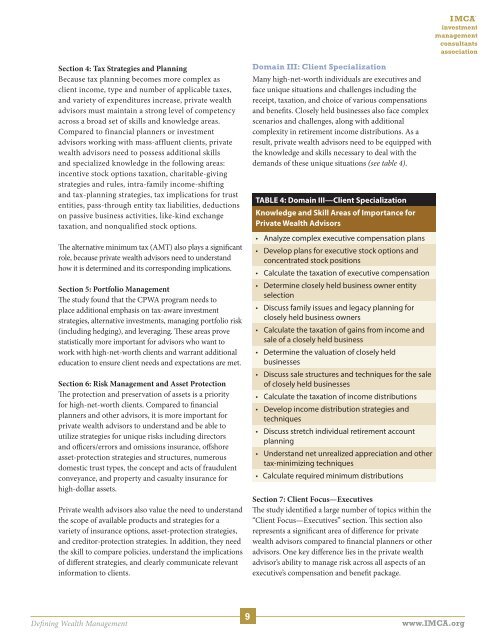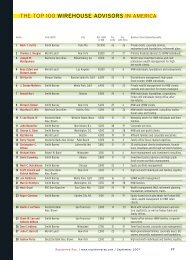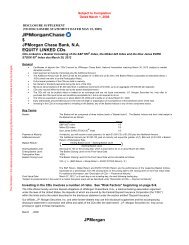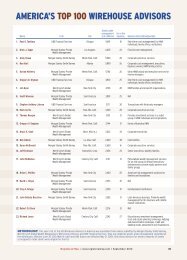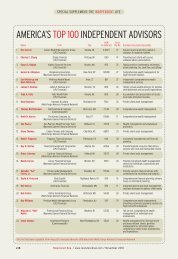Defining Wealth Management, Serving High-Net-Worth Clients
Defining Wealth Management, Serving High-Net-Worth Clients
Defining Wealth Management, Serving High-Net-Worth Clients
Create successful ePaper yourself
Turn your PDF publications into a flip-book with our unique Google optimized e-Paper software.
investment<br />
management<br />
consultants<br />
association<br />
Section 4: Tax Strategies and Planning<br />
Because tax planning becomes more complex as<br />
client income, type and number of applicable taxes,<br />
and variety of expenditures increase, private wealth<br />
advisors must maintain a strong level of competency<br />
across a broad set of skills and knowledge areas.<br />
Compared to financial planners or investment<br />
advisors working with mass-affluent clients, private<br />
wealth advisors need to possess additional skills<br />
and specialized knowledge in the following areas:<br />
incentive stock options taxation, charitable-giving<br />
strategies and rules, intra-family income-shifting<br />
and tax-planning strategies, tax implications for trust<br />
entities, pass-through entity tax liabilities, deductions<br />
on passive business activities, like-kind exchange<br />
taxation, and nonqualified stock options.<br />
The alternative minimum tax (AMT) also plays a significant<br />
role, because private wealth advisors need to understand<br />
how it is determined and its corresponding implications.<br />
Section 5: Portfolio <strong>Management</strong><br />
The study found that the CPWA program needs to<br />
place additional emphasis on tax-aware investment<br />
strategies, alternative investments, managing portfolio risk<br />
(including hedging), and leveraging. These areas prove<br />
statistically more important for advisors who want to<br />
work with high-net-worth clients and warrant additional<br />
education to ensure client needs and expectations are met.<br />
Section 6: Risk <strong>Management</strong> and Asset Protection<br />
The protection and preservation of assets is a priority<br />
for high-net-worth clients. Compared to financial<br />
planners and other advisors, it is more important for<br />
private wealth advisors to understand and be able to<br />
utilize strategies for unique risks including directors<br />
and officers/errors and omissions insurance, offshore<br />
asset-protection strategies and structures, numerous<br />
domestic trust types, the concept and acts of fraudulent<br />
conveyance, and property and casualty insurance for<br />
high-dollar assets.<br />
Private wealth advisors also value the need to understand<br />
the scope of available products and strategies for a<br />
variety of insurance options, asset-protection strategies,<br />
and creditor-protection strategies. In addition, they need<br />
the skill to compare policies, understand the implications<br />
of different strategies, and clearly communicate relevant<br />
information to clients.<br />
Domain III: Client Specialization<br />
Many high-net-worth individuals are executives and<br />
face unique situations and challenges including the<br />
receipt, taxation, and choice of various compensations<br />
and benefits. Closely held businesses also face complex<br />
scenarios and challenges, along with additional<br />
complexity in retirement income distributions. As a<br />
result, private wealth advisors need to be equipped with<br />
the knowledge and skills necessary to deal with the<br />
demands of these unique situations (see table 4).<br />
TABLE 4: Domain III—Client Specialization<br />
Knowledge and Skill Areas of Importance for<br />
Private <strong>Wealth</strong> Advisors<br />
• Analyze complex executive compensation plans<br />
• Develop plans for executive stock options and<br />
concentrated stock positions<br />
• Calculate the taxation of executive compensation<br />
• Determine closely held business owner entity<br />
selection<br />
• Discuss family issues and legacy planning for<br />
closely held business owners<br />
• Calculate the taxation of gains from income and<br />
sale of a closely held business<br />
• Determine the valuation of closely held<br />
businesses<br />
• Discuss sale structures and techniques for the sale<br />
of closely held businesses<br />
• Calculate the taxation of income distributions<br />
• Develop income distribution strategies and<br />
techniques<br />
• Discuss stretch individual retirement account<br />
planning<br />
• Understand net unrealized appreciation and other<br />
tax-minimizing techniques<br />
• Calculate required minimum distributions<br />
Section 7: Client Focus—Executives<br />
The study identified a large number of topics within the<br />
“Client Focus—Executives” section. This section also<br />
represents a significant area of difference for private<br />
wealth advisors compared to financial planners or other<br />
advisors. One key difference lies in the private wealth<br />
advisor’s ability to manage risk across all aspects of an<br />
executive’s compensation and benefit package.<br />
<strong>Defining</strong> <strong>Wealth</strong> <strong>Management</strong><br />
9<br />
www.IMCA.org


